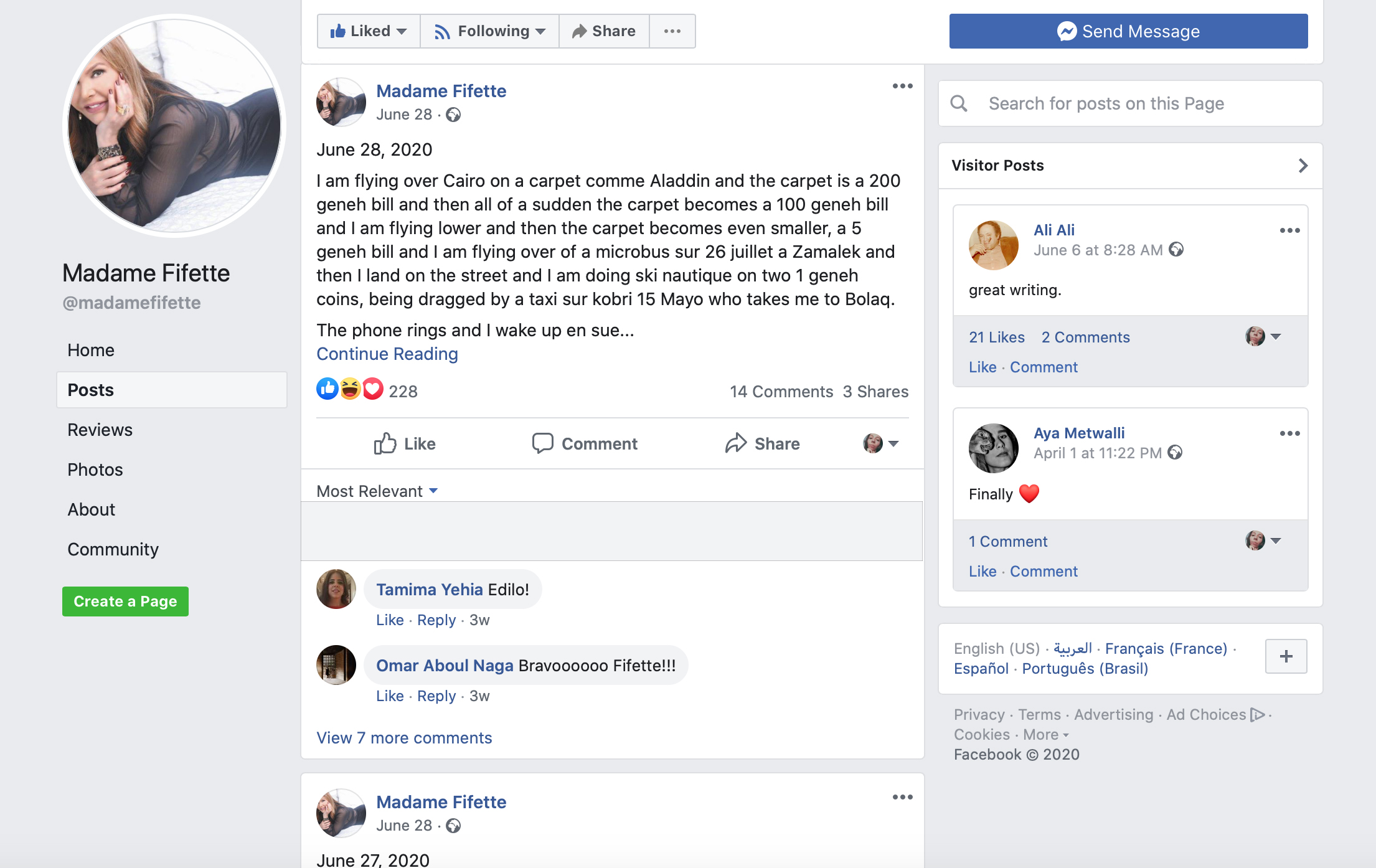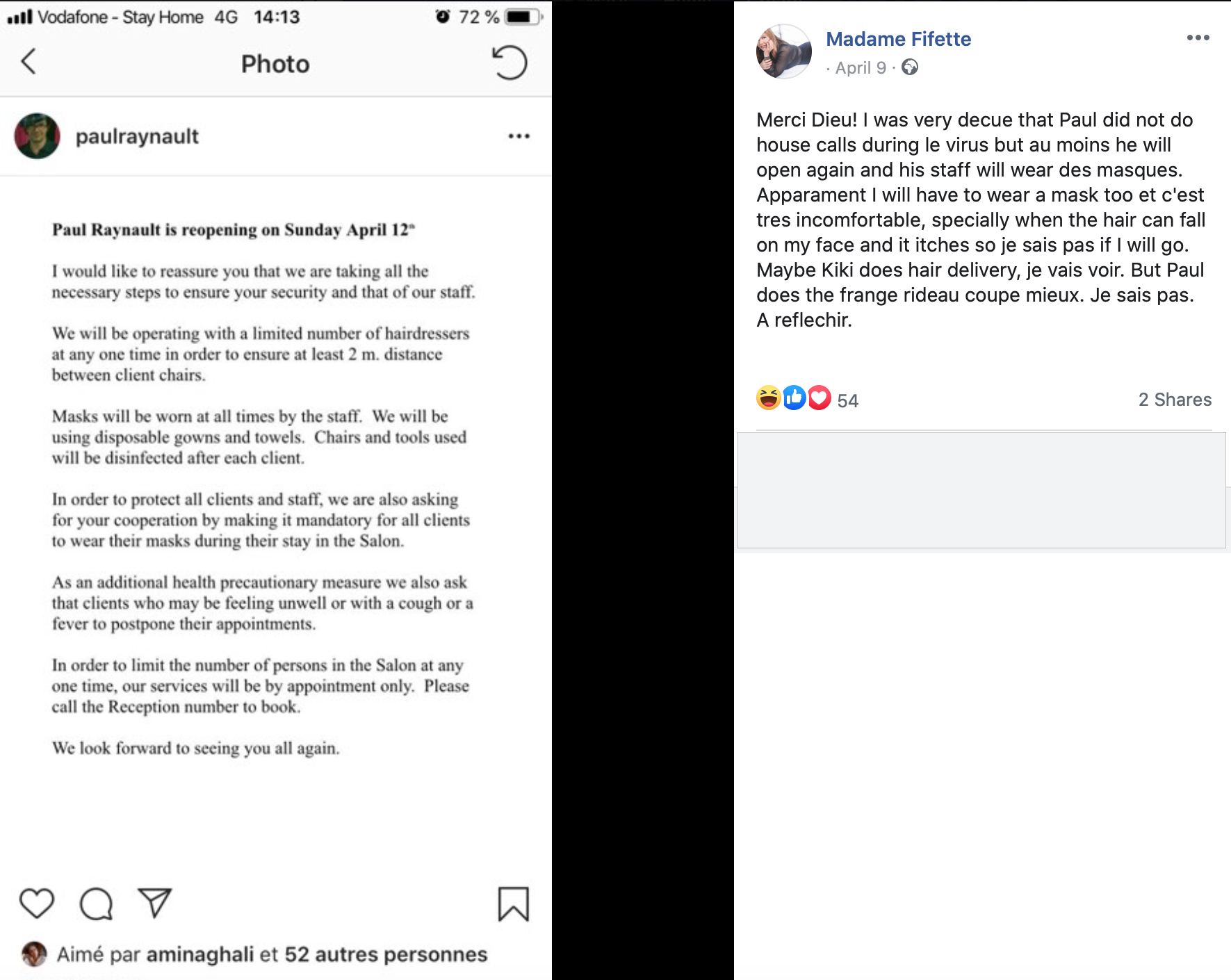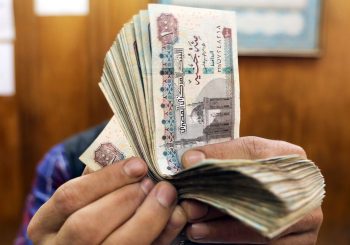The designer-wearing, Zamalek-loving, outspoken character many people have grown to know and love over the past few months on Facebook is the utterly charming Madame Fifette. Although a fictional character, she has grown to become a very real part of the lives of those who follow her.
Ever since the pandemic forced us to stay inside and find other ways to fill our daily lives from home, most people tended to explore cooking, take up a regular workout routine, bake bread or simply flock to social media.
Madame Fifette chose to write, ultimately catering to those who chose to flock to social media. Not only does she write, but she eloquently exposes the intricacies of everyday life in Egypt in very ‘Madame Fifette’ fashion – harshly, bluntly, intimately and hilariously.
Whilst taking us on a journey through her – rather interesting and eventful – daily life, Madame Fifette manages to shine light on various aspects of Egyptian society (from racism to classism). In addition to this, she also adds multiple layers of relatability that very simply speak to whoever is reading her very personal journal entries.

She is a woman who shamelessly says what everyone else is thinking, seeming very shallow and very human at the same time, yet managing to represent Egypt in a very unique way.
“Since pandémie, Dr. Tawouk (Fifette’s therapist) has been encouraging me to write to deal with the stress,” Madame Fifette tells Egyptian Streets when asked about her writing, “In beginning, was just stress about le virus. For me, anything made in China is scary and bad quality, so when we had first case here, I had a lot of palpitations and writing helped me cope. And Xanax of course.”
While often making references to taking Xanax quite regularly, in addition to making snarky – and, oftentimes, racist – remarks, one can’t help but feel as though Madame Fifette’s character is an all too real portrayal of a generation and class some Egyptians may be very familiar with.
Yes, Madame Fifette makes racial taboos, displays classism and religious discrimination and the sheer satire there can be very uncomfortable at first glance, yet, she is still human and representative of a generation that was just reared this way. However, in a way, she makes us realize that there’s a need for learning and shedding old harmful thought patterns. In the midst of racial slurs and what may be deemed offensive or taboo topics, she manages to showcase a very vulnerable and human side to her.

“But then pandemie opened the box you know? Is it le banadoura box that you call it? Anyway, yes, it opened le banadoura box and everything was starting to fall apart and I felt my family and security were vulnerable,” explains Madame Fifette regarding how the pandemic has affected her.
As time passed, almost in line with what most people were going through during the pandemic, Madame Fifette’s satirical journal entries were often lined with profound messages and realizations.
“People change when they are faced with their own mortality. Suddenly constipation becomes diarrhee and everything stuck inside comes out,” the Zamalek socialite elaborates regarding ‘the box’ the pandemic has opened for her, “I discovered things about mon mari (my husband), about my children and even about myself. But bien like all femme elegante, I cannot go into details… If you share what happens inside a home, it will stink like tom (garlic).”
“But what I can say is that, in a weird way, I feel much more alive since pandemie,” Madame Fifette adds.

From one adventure to the next, her journal entries unveil a multitude of layers to the once purely shallow Madame Fifette of earlier entries; and with time, audiences grew to understand her, to love her, to feel for her and to learn with her.
“Be the ink of your own pen,” Madame Fifette advises, “Life is hard and a lot of things are not in our hands but a lot of things are, so fight. Giving up is a slow death, but fighting can be a slow rebirth.”
“I did things that I never thought I could do before pandemic,” she explains, “I saw my old love, I took care of my husband’s debts and (please don’t tell my friends at le nadi) I tried le hashish when pharmacien (pharmacist) Nader was out of Xanax.”
Another aspect to Madame Fifette that many can undoubtedly relate to, is her love/hate relationship with Egypt. Despite the various jabs or critiques directed at the country, her love for it ultimately shines through. “When you love someone or something truly, you don’t see it with your eyes, you see it with your heart. Egypt habibti has always been and will always be beautiful. Before virus and after virus,” she says.
“But les Egyptiens (the Egyptians), that’s another story. Les shibshibs and the long pinky fingers and the eating with mouth open. Oh Mon Dieu (My god), all this shock to me. Wasn’t like this when I was growing up. There were gentleman and elegant women. Now it’s beards and Darth Vaders. C’est triste (It’s sad),” she continues, of course.

As her character has grown immensely with us during the past couple of months, Madame Fifette has become somewhat of a comforting friend. Someone we can all rely on to tell it as it is. When it comes to what the future has in store for her, she simply says, “I feel that I lost too much time in life being the daughter of, the wife of, the mother of. Pandemie made me realize that I want bigger achievement than being Gourmet’s customer of the month four times last year.”
One might winder what kind of ambitions someone such as Fifette might have when it comes to future endeavors… it turns out she already has something up her ‘designer’ sleeve.
“So this is not official yet but… I am starting my own business with Che Khiyara and Papita,” she continues, “I cannot say what it is before it is launched. One should not put on the shoe before the socks.”
As audiences eagerly await Madame Fifette’s daily musings, the satirical fictional character reminds us of the bonds we tend to create with fictional characters in Egypt – from the famous Ramadan duo Boogie and Tamtam to the wonderfully outspoken Abla Fahita. For one reason or another, whether it be their blunt humor or the entertaining aspect they offer, the general Egyptian population tend to make these characters part of their daily lives.






Comment (1)
[…] الحوار موقع “إيجيبشان ستريتس” الإخباري الناطق بالإنجليزية، وهي كما تصفها ماري: […]